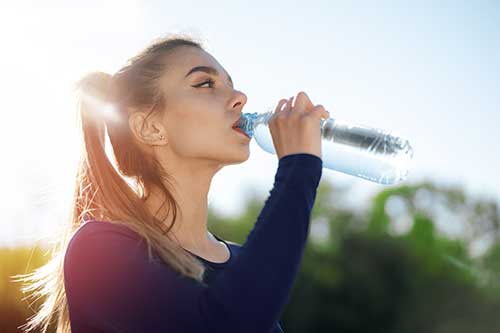Common Problems in Women during Summer
Summer is definitely here. The heat waves sizzle away, the sweetest of fruits line the streets, sounds of children enjoying their holidays everywhere and the thoughts of a family holiday around the corner lifts our spirits. But summer is also the time when some illnesses are a lot commoner than the rest of the year. Here is a snapshot of common presentations in a gynaecological, more specifically in an urogynaecological clinic.

Heat, sweat and dehydration
During summer we tend to loose a lot of water through sweat and in many other ways. Keeping hydrated is essential. The average adult needs to drink at least 2-21/2 litres of water. Liquids in the form of juices, buttermilk and coconut water also count and give the body a supply of much needed electrolytes too. But it is important to avoid excess sugary and aerated drinks as much as it is tempting. Patients on fluid restriction such as those with kidney and cardiac problems need to check with their own physician before increasing their water intake.
Urinary tract infections (UTI)
UTI‘s are very common in summer. Dehydration is the main cause. Women should pay attention to mild symptoms and get treatment as early as possible.
The usual symptoms are lower abdominal pain and pain and burning while passing urine.
In majority of the patients, the symptoms are left untreated too long and this then becomes a chronic problem. UTI’s are easy to treat at an early stage but can spread to the kidneys and cause long-term damage to the bladder if left untreated.
Drinking adequate water, not holding urine for long periods of time, avoiding teas and coffees, avoiding bladder irritants such as soda, tomato and citrus in large amounts are good bladder habits to name a few.
Vulval and Vaginal Infections
The commonest vaginal infection is thrush infection or candidiasis. Yeast thrives in warm temperatures and in moist conditions. Women with diabetes are particularly susceptible. Maintaining strict hygiene, avoiding perfumed washes, and changing pads frequently during periods and wearing cotton underclothes helps a great deal.
It is also common to see patients with skin rashes secondary to this infection especially in the groin and vulva.
Heat boils, which are blocked hair follicles, are frequent problems due to the heat and sweat. Good hygiene helps significantly. The addition of probiotics in the diet along with a low fat diet helps too.
Renal Stones
While Urinary tract infection is the commonest problem, a substantial rise in women presenting with renal stones is seen in summer. This condition presents similar to an UTI and in addition women may experience blood in their urine. The pain with a renal or ureteric stone tends to be very severe needing immediate admission and treatment. Stones can be avoided by drinking water adequately, avoiding excessive spices and attending to any bladder symptoms as soon as possible.
Menopause
Some women, who are menopausal, can experience flushes or a sudden flash of heat, which can be quite uncomfortable. Summer can make menopausal symptoms such as hot flushes and night sweats worse. Treatment is usually very effective. Keeping your surroundings cool and well ventilated, good hydration and light cotton clothes are very helpful.
The Holiday Rush
There is routinely a rush to have many elective procedures such as surgery for fibroids, prolapse and incontinence in summer. Especially for women the school holidays seem to be a convenient time for a multitude of reasons. To organise help from family or friends, to rest and recuperate without the pressures of home chores, this seems a good time.
But beware they might be some waiting time to get your surgeries during this time. Therefore it is a good idea to plan with your doctor ahead of time.
Overall, increasing your water intake, adding plenty fresh fruits to your diet, and attention to hygiene will make summer enjoyable and will help you avoid unnecessary trips to the hospital.


